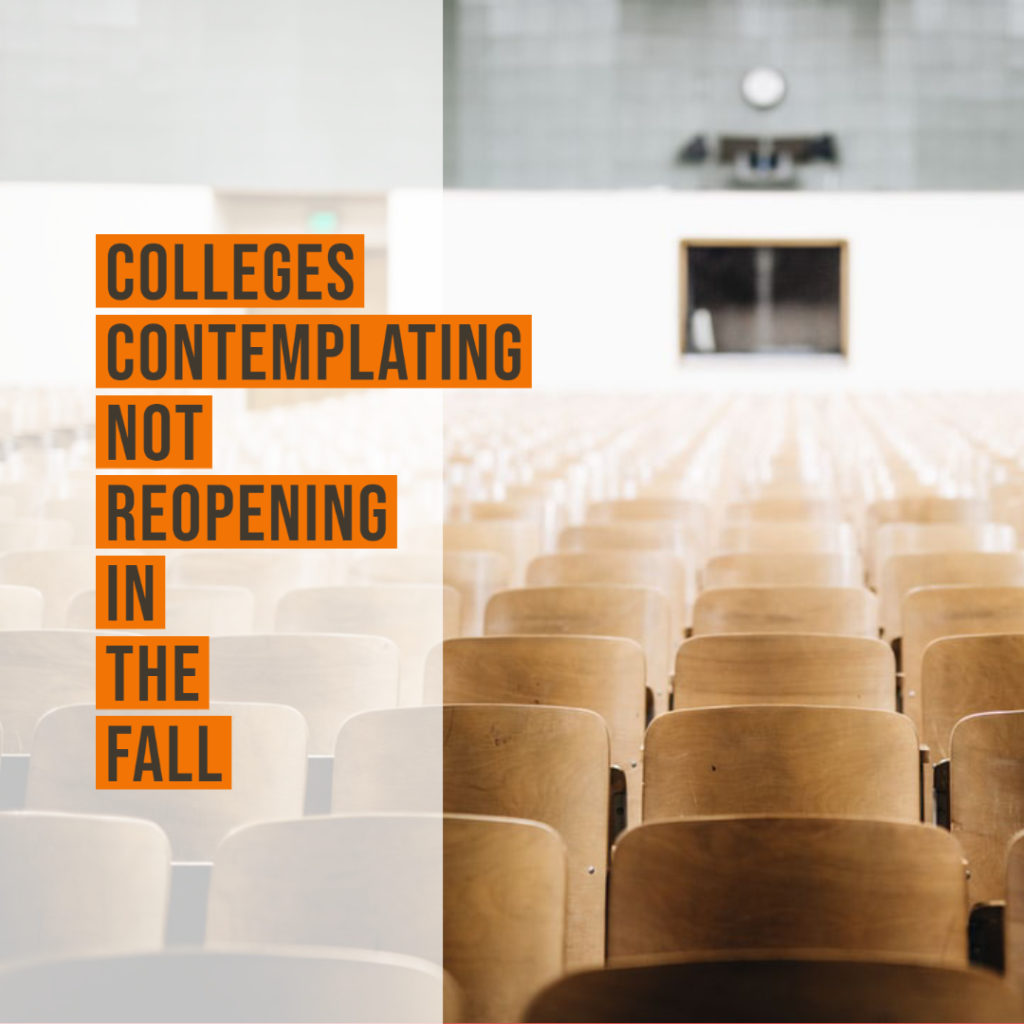
Many of you are in this college limbo. Your student was accepted to college in the fall, you’ve accepted the offer, and now there’s talk of colleges not opening campus to students. The concern is that if one college does it, they will all follow suit–just as they did in March with the closings.
We are already seeing rumblings and articles in the news about colleges not reopening in the fall. Here are just a few:
Boston University Is First To Announce It May Postpone Opening Its Campus Until January 2021
Boston University appears to be the first American college or university to announce that it may not resume live classes until January 2021. If public health officials deem it unsafe for students to congregate, the campus could remain closed until the start of next year.
Richard Ekman, president of the non-profit Council of Independent Colleges, says that some of the 659 colleges in his group have begun quietly to consider whether they too will have to postpone campus openings. Some are discussing start date delays of a month. Others are looking at more extended closures. “They’re all waiting to get better health information,” he says.
Already, universities are planning for a fall without students on campus — just in case
“We’ve got to be prepared for 100 percent online and virtual and 100 percent on campus and everything in between,” said University of Massachusetts president Martin Meehan. The UMass system lost more than $100 million this school year due to COVID-19 and the refunding of student room and board fees.
Will Universities, Colleges, and Law Schools Campuses Reopen in Fall 2020?
Universities and law schools aren’t ready to make a decision because the pandemic is so fluid and there is so much uncertainty, nor do they have to yet. But the question is being discussed on a daily basis, and we have spent a good deal of time speaking with college presidents, provosts, and deans and trying our best to get the most recent and trust-worthy epidemiological modeling and medical community input.
Even if campuses reopen this fall, colleges worry many students won’t return
“This crisis is causing massive disruption to students, institutional operations and institutional finances. On some campuses, it is creating an existential threat, potentially resulting in closures,” Ted Mitchell, the group’s president, wrote in a letter to Education Secretary Betsy DeVos.
Even colleges with deep reserves are expecting a painful financial blow from the pandemic. Brown University was among the first to announce a hiring freeze, citing “dramatic reductions in revenue.” Yale University followed on March 31, asking departments to update budgets in preparation of a “significant loss” in revenue.
‘We’re on the edge of the precipice’: How the pandemic could shatter college dreams
Early national surveys ocof high school seniors are showing those who initially were bound for four-year colleges changing their first-choice schools for something less expensive. Some of those surveyed say they are thinking of giving up on going to college in the fall entirely.
The financial stress for families was cited. About 63 percent of students said they would still enroll in college but were worried about whether they could attend the school of their choice, while 17 percent said their plans have changed, according to the education consultants Art and Science Group.
Students with changed plans said in the survey that they would take a gap year, enroll part time at a four-year institution, go to community college, work full time or enroll in a certificate program. Some still didn’t know what their plans would be. Other surveys have also found similar conclusions.
Already, universities are planning for a fall without students on campus — just in case
Colleges and universities in Massachusetts and across the country have begun planning for what was once an unthinkable scenario but now may be a real possibility: a fall semester without students on campus.
University officials said they are trying to figure out how to re-open safely, how much public health testing is needed for students and staff to be on campus even if there’s no coronavirus cure, whether large lecture classes should be held, how many staff to employ, whether to augment their online capabilities, even what to charge students for online classes.
What will your student decide to do? Will they decide to take a gap year? Will they choose to enroll close to home and save money while living at home? Will they enroll and be satisfied with taking classes online?
Hopefully, colleges will know more by July and be able to make a concrete decision. It’s certainly uncertain times we live in and it’s especially affecting college students and their families.

